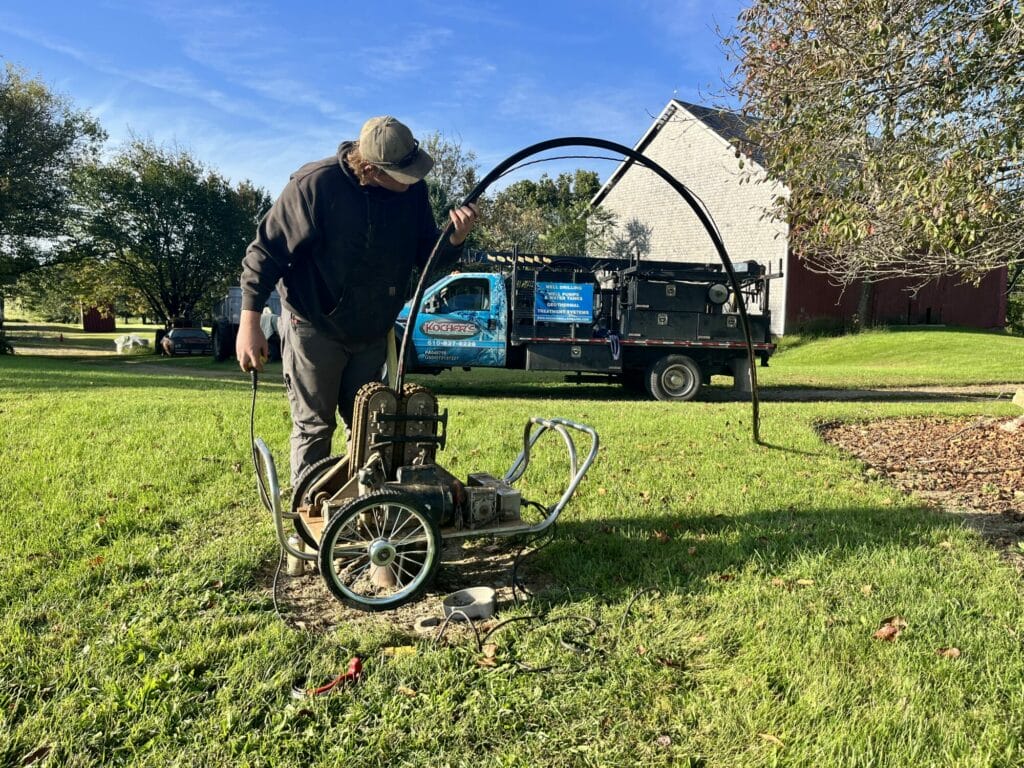When it comes to the purity of your drinking water, there’s more than meets the eye. Coliform bacteria, including its more dangerous subset, fecal coliform, can seep into well water, turning a private water supply into a health hazard. For well owners, understanding the risks and solutions is crucial for ensuring the water you drink is safe and clean.
Understanding the Presence of Coliform Bacteria
Coliform bacteria are a broad group of microorganisms found in the environment, including the soil, vegetation, and the intestines of warm-blooded animals. They serve as indicators for your water’s safety. While not all coliforms are harmful, their presence can signal other dangerous bacteria and potential health risks. According to the New York State Department of Health, total coliforms are a group of closely related bacteria that are (with few exceptions) not harmful to humans.
- Total Coliform as a Warning Sign: Indicates possible contamination and the need for further investigation.
- Fecal Coliform as a Red Flag: Directly points to contamination from human or animal waste, as noted by Oregon State University’s Extension Service.
Testing Your Water for Coliform Bacteria
Regular testing for coliform bacteria is a must for private well owners. A positive test result for coliform bacteria in your water necessitates immediate action. It’s the most reliable way to detect contamination early and take necessary action. The Mississippi State University Extension outlines the importance of testing and the implications of a positive result in more detail. Here’s what you should know:
- Water Test: Essential for detecting coliform and guiding further action.
- Water Sample: Proper collection is critical for accurate results.
- Test Result Interpretation: Understanding what your results mean for your water quality.
Bacterial Contamination of a Well: Finding the Source
Identifying the source is imperative if coliform bacteria are detected in your well water. Common culprits include:
- Surface Water Infiltration: Runoff can introduce bacteria into your well.
- Faulty Well Construction: Compromises in the well cap or casing can allow bacteria to enter.
- Nearby Septic Systems: Improperly maintained septic systems can leach contaminants into groundwater.
Disinfect the Well: Steps to Eliminate Bacteria
When your well water test indicates the presence of coliform bacteria, it’s a clear sign that action is needed. Disinfecting your well is critical to eliminate harmful bacteria and ensure your water is safe to use. This process, often called shock chlorination, is a thorough method to address contamination.
Chlorinating the Well
A calculated amount of bleach or chlorine is introduced into the well, a common practice when tests show positive for coliform bacteria. This powerful disinfectant is designed to kill the coliform group and other bacteria that may have entered the water supply. The amount used must be carefully measured to be effective without causing harm to the well’s structure or the environment.
Protecting Well Components
Protecting the well components during this process is essential. Using the correct concentration of chlorine and following proper procedures ensures that the disinfection process does not damage the well casing or the sanitary well cap. Licensed well drillers or water system professionals can provide guidance and services to ensure that every part of your well is safeguarded during disinfection.
Retest the Water: Ensuring Safety Post-Treatment
After the disinfection process, it’s crucial to retest the water to confirm that the coliform bacteria are no longer present. If the water tests positive for coliform bacteria after the initial treatment, the disinfection process may need to be repeated. Only when the water tests negative for total coliform and fecal coliform bacteria should it be considered safe for consumption. This retesting should be done a few weeks after disinfection to give any residual chlorine time to dissipate and to ensure that bacteria have not re-entered the well.
Drinking Water Standards: Meeting Health Guidelines
Private well owners have the responsibility to ensure their water meets drinking water standards, which are in place to protect against the risks posed by coliform and other bacteria. These guidelines ensure that the water from a private well is safe for all household uses. Regular testing for bacteria, especially the total coliform group, is a proactive measure that helps in the early detection of any issues. When water tests positive for total coliform, it indicates potential contamination and the need for further assessment and possible treatment.
Continuous Option for Water Supply Disinfection
For those seeking ongoing protection, continuous disinfection methods offer a reliable solution. Here’s how they can safeguard your water supply:
UV Treatment Systems:
- Direct Well Treatment: These systems can be installed to treat the water as it comes directly from the well.
- Natural Protection: UV treatment is effective against the types of bacteria that occur naturally in the environment.
- No Chemicals: This method doesn’t rely on chemicals, making it a safe choice for your family and the environment.
Chlorination Systems:
- Continuous Disinfection: Chlorinators can provide a constant barrier against bacteria that may enter your water supply.
- Addressing Multiple Issues: They are especially useful in areas with multiple water quality concerns.
- Preventative Care: Regular chlorination helps prevent bacteria from establishing a presence in your water system.
Why Choose Continuous Disinfection?
- Layered Security: Continuous systems treat water in small amounts, offering consistent protection against contamination.
- Environmental Factors: They are ideal for well owners in areas close to potential contamination sources, such as agricultural runoff or septic systems.
- Persistent Threats: Continuous disinfection is a proactive measure against the presence of coliform bacteria, which are common in some regions.
By incorporating these systems, well owners can significantly reduce the risk of water contamination, ensuring that every drop of water from their private well is clean and safe for every use.
Coliform Bacteria Are Detected: Immediate Actions
If you find that your water tests positive for total coliform or fecal coliform bacteria, immediate steps should be taken:
- Stop Drinking the Water: Use bottled water for drinking and cooking until the issue is resolved.
- Consult a Licensed Well Driller: Professionals can assess and fix any well integrity issues.
- Implement Water Treatment Solutions: Consider installing a water treatment system for ongoing protection.
Certainly, let’s incorporate these terms into a strong call-to-action (CTA) paragraph for the article, with the necessary details and a link to the contact page.
Secure Your Water System with Kocher’s Expertise 🛠️💧
When it comes to the integrity of your water system and well casing, you need a partner who understands the intricacies of well water safety. At Kocher’s Water Pumps & Tanks Inc., we’re more than just experts – we’re your neighbors – dedicated to ensuring that the water you drink is clean and safe. Here’s why you can trust us with your well water needs:
- Local Knowledge: Our deep understanding of regional water systems means we’re well-equipped to handle the unique challenges your well may face.
- Comprehensive Solutions: From identifying the source of bacteria to resolving any bacteria problem, we offer end-to-end services to keep your water pure and pristine.
- Quality and Reliability: We use only the best materials and practices to ensure your well casing stands the test of time, protecting your water supply from contaminants.
Don’t let water quality issues disrupt your peace of mind. If you’re in our service areas across Pennsylvania, let’s ensure your water is safe and your system is secure. Connect with us today at Kocher’s Contact Page and take the first step towards crystal-clear water. Remember, we’re here to help – because your water’s purity is our priority.




